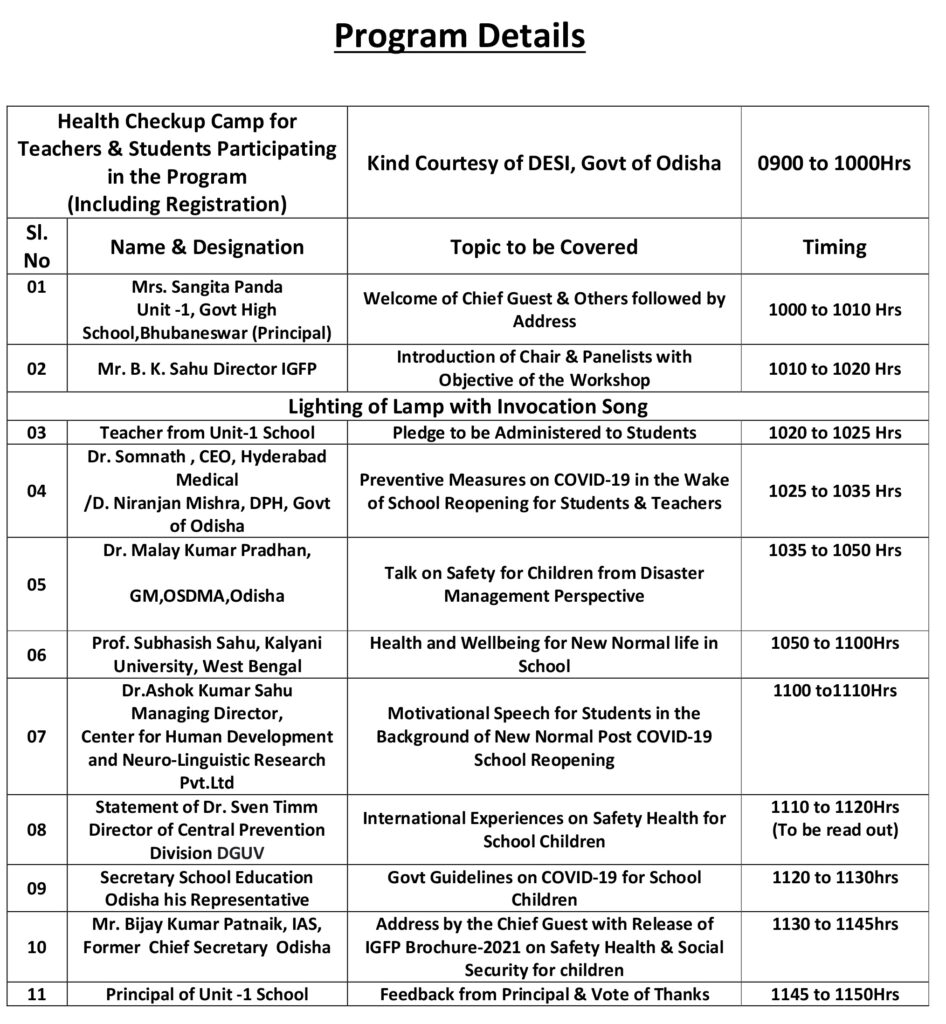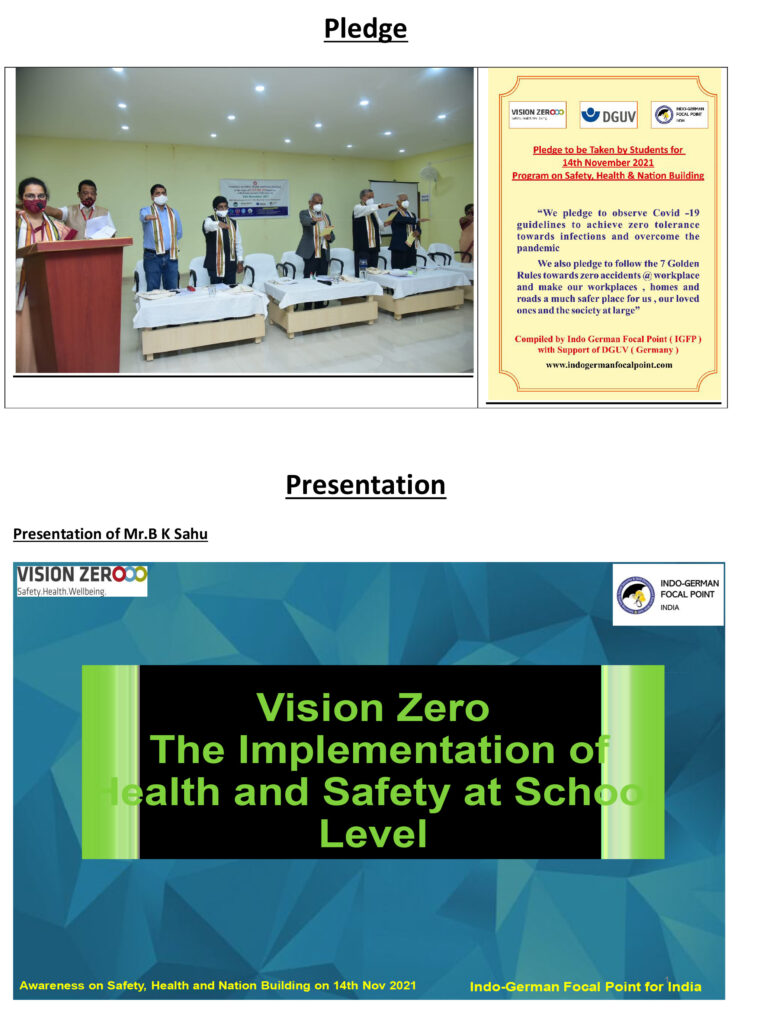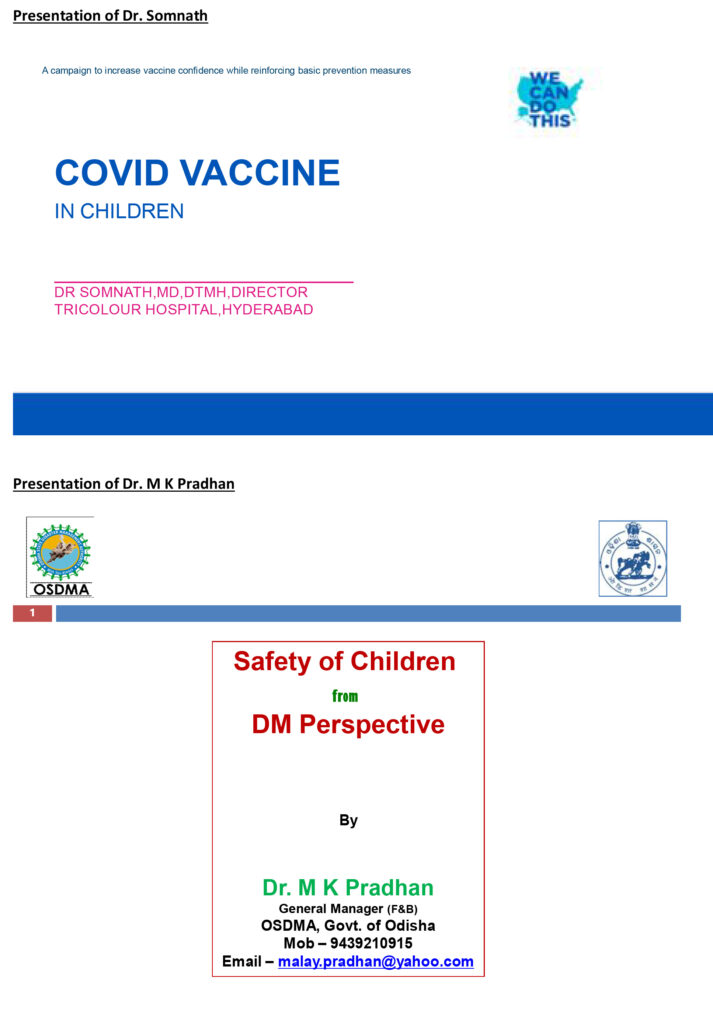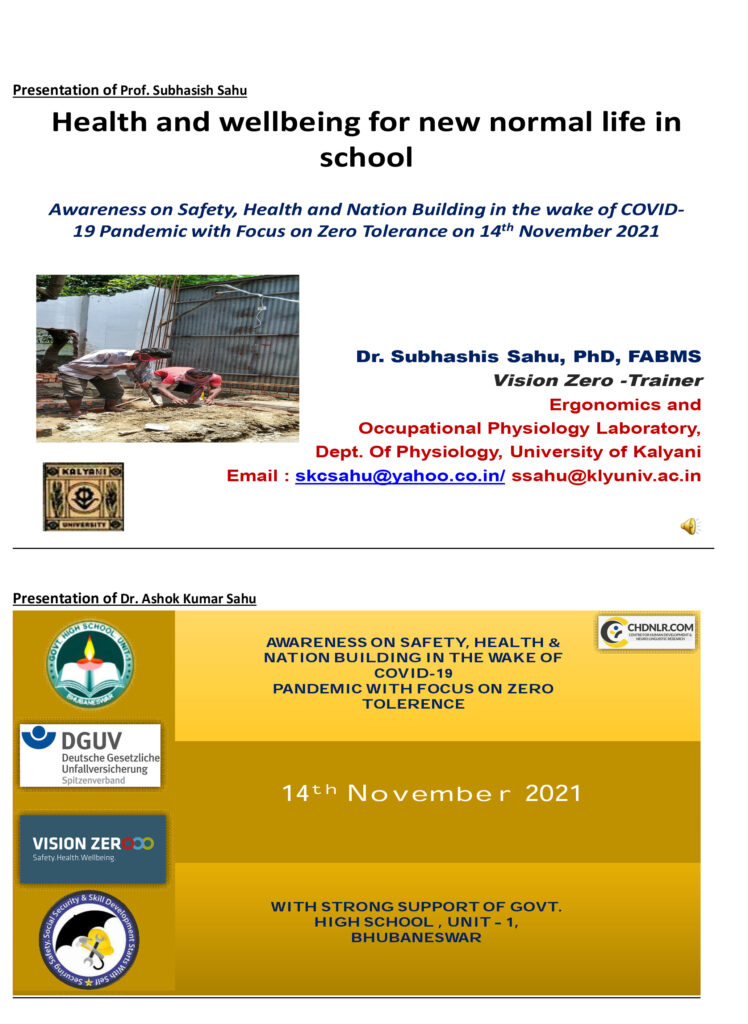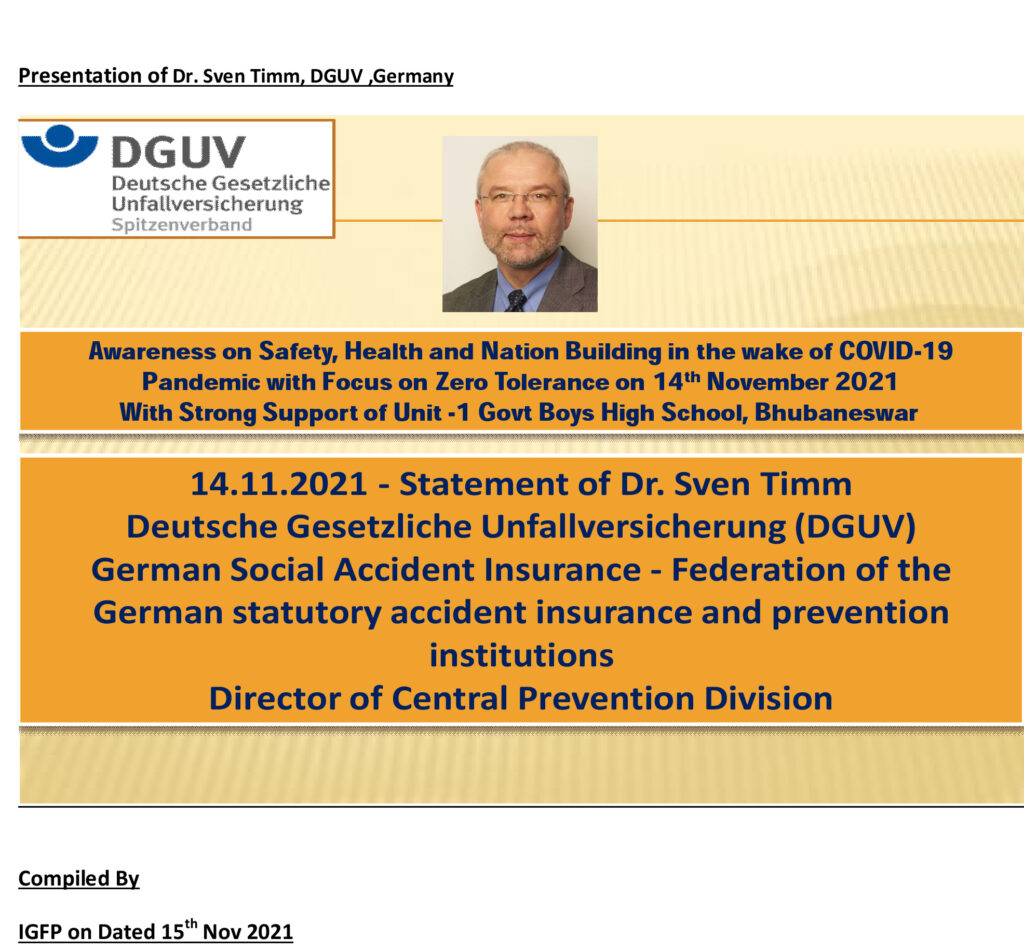Author: Indo German FP
Workshop on Occupational Safety, Health and Social Security Problems Relating to Gig and Platform Workers Including Those Employed by Small Businesses and Traders During COVID-19 Pandemic On 26th February 2022 @ Security Services (P) Ltd. (GISS), Cuttack


Takeaways / Press Note
- The ‘gig economy’ is an offshoot of the process of liberalization. It consists of small tasks (called ‘gig’) that a worker performs. ‘Gig work’ comprises of income–earning activities outside of traditional long-term employer-employee relationship.
- The gig worker after completing one task moves on to next gig either with the same or different company, which can be also he a small business or trader. The person becomes a platform worker if a platform is used to dispense the work.
- Both gig and platform work are defined in Sections 2 (35), 2 (60) and 2 (61) of the Code on Social Security, 2020.
- Gig workers are engaged is various types of establishments both in formal and informal sectors.
- The positive aspects of gig work include working hour flexibility, autonomy, additional earning, increasing women participation, source of income for students etc.
- The negative aspects include no income guarantee, lack of remunerative jobs, long and tedious working hours, ergonomic problems, complete absence of social security and protection, EMI pressure and non–applicability of labour laws in the absence of employer-employee relationship.
- There is need for enrolment of gig worker in E-shram portal of Ministry of Labor Employment, early implementation of the Code, providing benefits under Unorganized Workers Social Security Act , 2008, formation of trade unions of gig workers, pursuing Golden Rules of Vision Zero etc.
- Guidelines issued by E-Commerce Companies for following of COVID-appropriate procedures are important. The solution lies in SMART I.e. stay at home when sick, mask –use while going out, avoiding large groups , refreshing indoor air and adopting ten feet distance instead of six in place of work.
- Occupational hazards have physical, chemical, biological, mechanical, psychological and ergonomic dimensions which need to be overcome.
- Ergonomic triangle consists of force, frequency and posture. It necessitates constitution of a Multi–disciplinary Advisory Committee to implement ergonomic-coping strategy.
Prepared by
Indo German Focal Point of India (IGFP) with Support of Dr Ashok Sahu Former SG,NHRC & LEA, MOLE
Minutes
The list of panelists is annexed.
Before ceremonial lighting of the lamp, Mr. B K Behera welcomed the guests, panelists and participants and explained the functions of the Security Services (P) Ltd. (GISS), and the importance of discussing today’s topic. He hoped that this opportunity will be utilized to make ESIC & EPFO aware of the organization’s requirements.
Mr. B K Sahu stated that two aims of the Workshop are to achieve zero fatality rate by following Vision Zero Golden Rules and providing social security to all workers. He urged the eligible workers to register themselves in the E-shram portal and requested the participants to give a feedback which would be reported to the Ministry of Labour & Employment.
Through Curtain Raiser, Dr. Ashok Sahu pointed out that the ‘gig economy’ is an offshoot of the process of liberalization. It consists of small tasks (called ‘gig’) that a worker performs. ‘Gig work’ comprises of income–earning activities outside of traditional long-term employer-employee relationship. The gig worker after completing one task moves on to next gig either with the same or different company, which can be also he a small business or trader. The person becomes a platform worker if a platform is used to dispense the work. Both gig and platform work are defined in Sections 2 (35), 2 (60) and 2 (61) of the Code on Social Security, 2020. Gig workers are engaged Is various types of establishments both in formal and informal sectors. The positive aspects of gig work include working hour flexibility, autonomy, additional earning, increasing women participation, source of income for students etc. The negative aspects include no income guarantee, lack of remunerative jobs, long and tedious working hours, ergonomic problems, complete absence of social security and protection, EMI pressure and non–applicability of labour laws in the absence of employer-employee relationship. There is need for enrolment of gig worker in E-shram portal of Ministry of Labor Employment, early implementation of the Code, providing benefits under Unorganized Workers Social Security Act , 2008, formation of trade unions of gig workers, and pursuing Golden Rules of Vision Zero etc.
Mr. K G Johnson indicated the activities of the Karnataka Construction Workers Welfare Board, irrespective of the occurrence of Covid-19, in terms of various welfare measures being provided like transfer of monetary benefits to the workers’ accounts directly, and provision of kits for protection & hygiene, sanitization, vaccination , immunity and food support etc.
Dr. M K Pradhan dwelt upon safety for traders, self-employed and delivery persons during Covid-19. It is a respiratory illness characterized by cough, shortness of breath, fever etc. due to which many unorganized workers are affected and working hours lost. It has given rise to a new normal situation where employers should encourage social distancing, self-isolation, hand-washing, surface cleaning, sanitizing, use of barriers and screens, staggered lunch break, avoiding large meetings, adoption Golden Rules of Vision Zero, practicing contactless delivery, and avoiding touching of eyes, nose or mouth. Guidelines issued by E-Commerce Companies for following of Covid-appropriate procedures are important. The solution lies in SMART I.e. stay at home when sick, mask–use while going out, avoiding large groups , refreshing indoor air and adopting ten feet distance instead of six in place of work. Regarding pandemics, he summed up by starting that forget what hurts you but never forget what they taught you.
Dr. Somnath stated that occupational hazards have physical, chemical, biological, mechanical, psychological and ergonomic dimensions which need to be overcome.
Dr. Subhasish Sahu pointed out that ergonomic triangle consists of force, frequency and posture. It necessitates constitution of a Multi–disciplinary Advisory Committee to implement ergonomic-coping strategy. Administrative controls may involve job rotation, re-designation of work methods, giving breaks, regular sanitization, maintenance of social distancing etc. Besides, safety monitoring, correct work posture, avoidance of unsafe work etc. are also important.
Mr. P S Panda explained various welfare schemes being provided by ESIC, particularly dependant benefits like pension to family members of deceased insured persons, and answered many questions asked by the participants.
Mr. Gopinath felt that everybody should stay healthy and dwelt upon Governmental support being provided to MSMEs.
Mr. G B Mallick offered obeisance to the Almighty to help in eradicating Covid-19 menace. He discussed about stress, psychological depression, Covid-appropriate behavior, importance of Ayurvedic and early treatment, enhancing immunity and providing right information. He pointed out that prevention is always better than cure and both life and livelihood are equally relevant.
The Workshop concluded with a vote of thanks.
Prepared by
Indo German Focal Point of India (IGFP) with Support of Dr Ashok Sahu Former SG,NHRC & LEA, MOLE
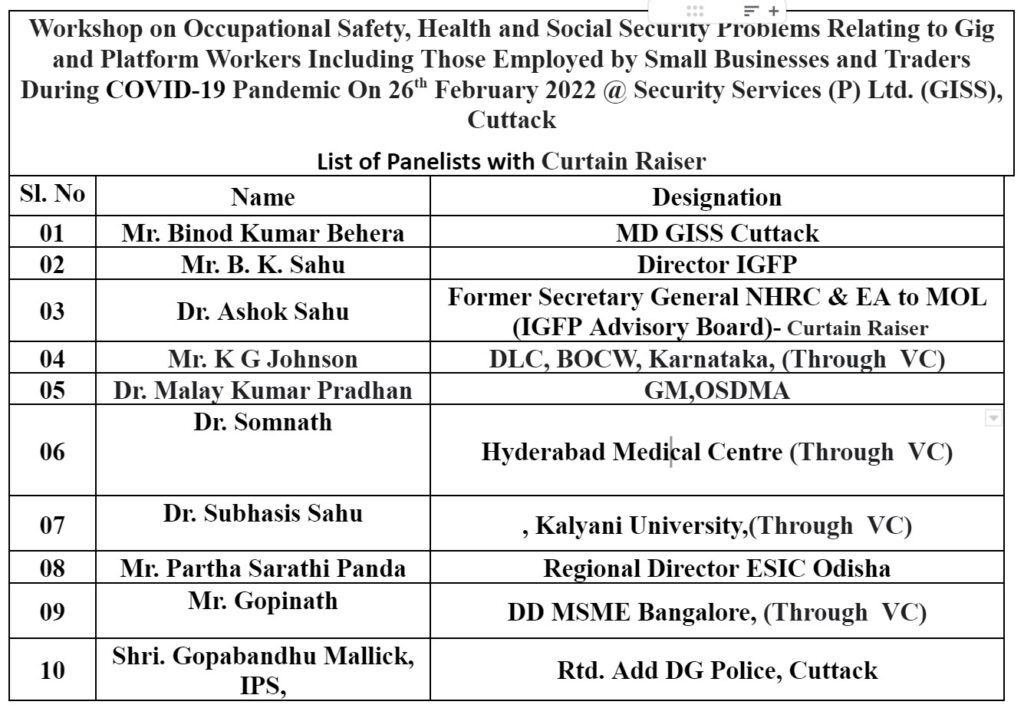
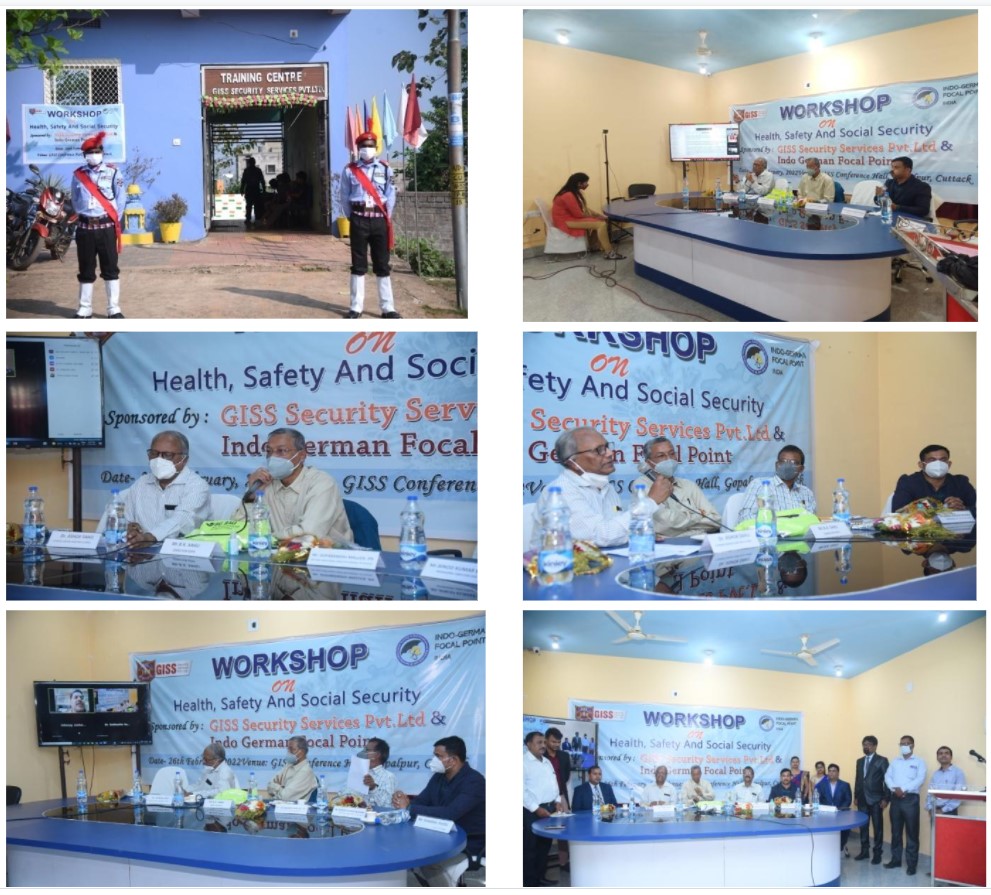










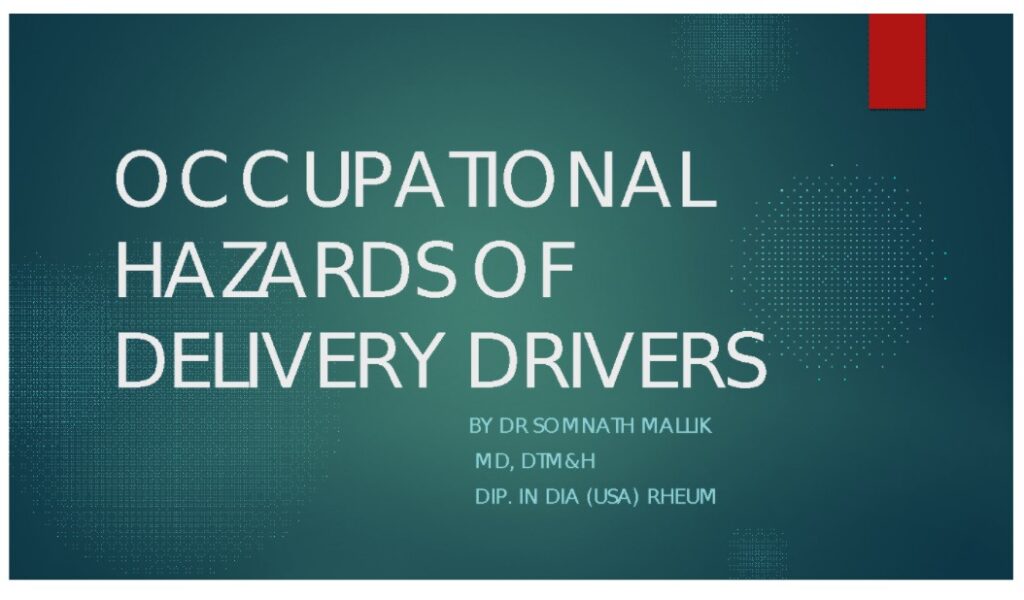
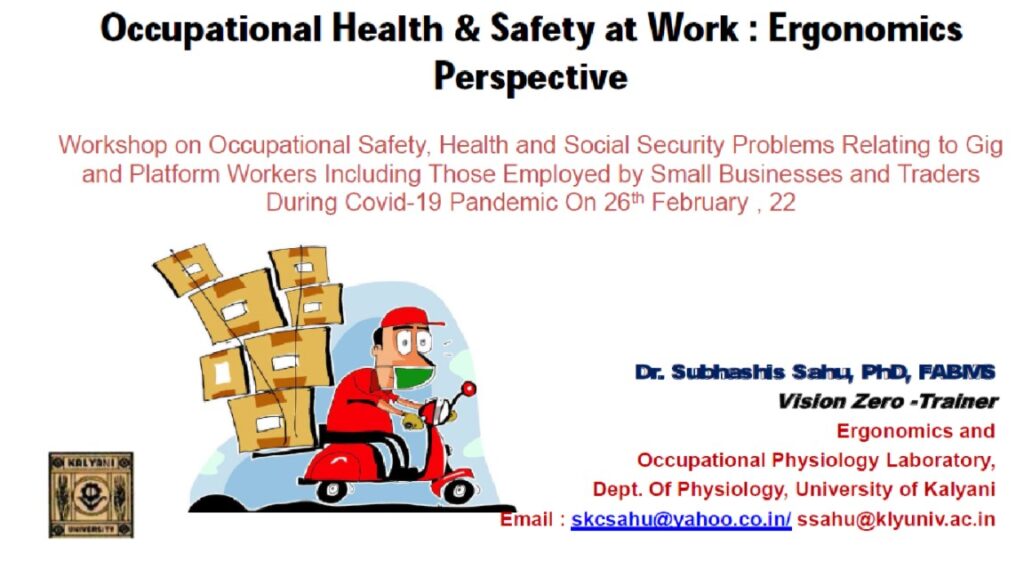
State Visit to West Bengal by Director IGFP on 22 nd Feb 2022 for Activity of Cooperation on OSH & SS


State Visit to Assam by Director IGFP on 21st Feb 2022 for Activity of Cooperation on OSH & SS


Visit to IIT Assam by Director IGFP on 21st Feb 2022 for Activity of Cooperation on OSH & SS


Takeaways & Summing up Recommendation’s Involving Textiles Workshop Including Handloom Handicrafts on 17th Jan 2022
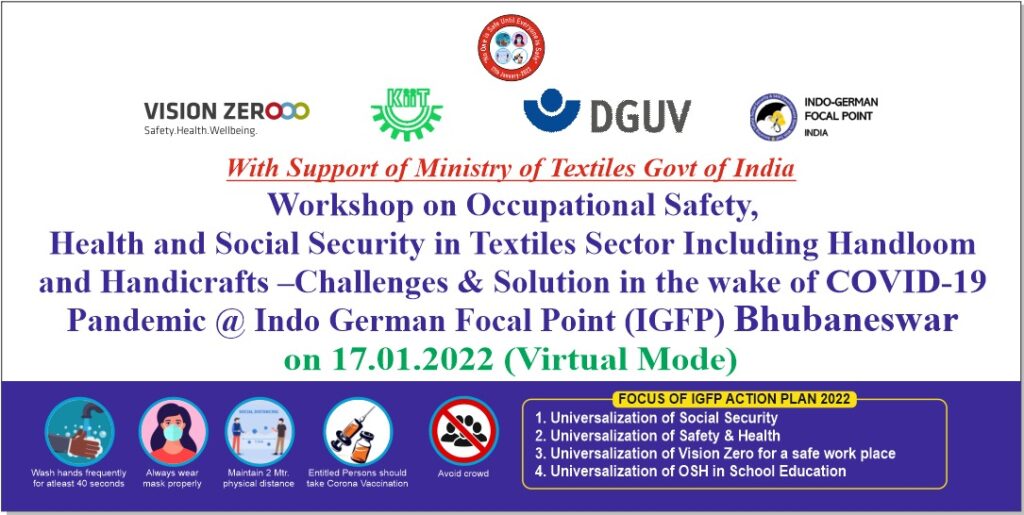
(Virtual Mode)
Summing up
1) Textile industry is one of the oldest industries in India and at present is the second largest employer with 10.5crore people directly and indirectly employed, accounting for 2.5%of country’sGDP,11%of industrial output and 11%of exports
2) Sustainability is an important factor for the industry with supply of cotton fibre from organic sources and manmade fibre from petroleum sources, which act as important raw material sources for garment units coming up in Odisha .
3)App developed by BGETEM, Germany could be adopted in India for dissemination of OSH information among workers as has been done in other countries including Bangladesh.
4) Need for greater awareness generation needed on OSH issues and govt schemes on social security.
5)Need for constitution amendment to make universal social security and health a fundamental right.
6)Main sources of hazards relate to cotton dust, noise, chemicals and chemical dyes, ergonomics and OSH policies and programmes must take into consideration the hazards originating from these sources.
7)A value -chain approach needs to be taken to identify OSH issues for textiles sector as each segment of the value -chain has a different OSH issue , The segments of the value -chain include ginning, spinning, weaving including hand looms and powerlooms processing, knitting, apparels &made -ups. The value -chain is distributed across different sectors including agriculture, large mills, MSMEs and the unorganized sector including the cottage and tiny sectors.
8)Focus on employers commitment for career opportunities of employees and skilling of women workers are important for the growth of textile industry.
9)ESIC scheme benefits are available to informal /unorganized, contractual workers working in organized /formal sector units in the industry
Prepared by
Indo German Focal Point of India (IGFP) with Support of Mr. P P Mitra Former Principal. LEA, MOLE, (IGFP Advisory Board)
Takeaways/Press Note
1. Even though the first wave of Covid-19 gave us a jolt in terms of closure of establishments and reduction in employment and income, because of various ameliorative steps taken, situation during the second and present third wave is broadly under control.
2. Textiles sector employs both formal and informal workers. For achieving zero fatality rate in this sector, Gujrat has resorted to (i) testing, (ii) training, (iii) mechanical and electrical interlocking of machines at rest and (iv) preparation of SOPs in Hindi and relevant regional languages.
3.Textiles establishments will have to meet decarbonization commitments. Environment, Social and Governance (ECG) aspects are important. Decent work conditions get covered in social aspect. Government should help in digitization work relating to unorganized textiles sector.
4. Textile workers are to be made aware of the health issues, so that they can take care of themselves. Textile cooperatives are to be made more broad-based.
5. Textile workers suffer from cotton dust, chemicals, noise and ergonomic conditions. Norms prescribed to minimize them need to be followed.
6. There should be free vaccination, compensation for death/disability, and payment of social security contribution by Government in respect of contract, outsourced and piece-rated workers. Occupational Safety, health and social security should be made a constitutional right for all workers including those engaged in textiles industry.
7. At international level various multinational Apps/Booklets etc. developed by BG ETEM and BG BAU are available on Occupational Safety and Health in textiles sector, which can be followed.
8. Earlier migrant workers used to come to host States with their families. Now they come alone; so the responsibility of management to look after them has increased.
9. Textile establishments need marketing help to overcome pandemic crisis. Technology providers should remove drudgery in textile manufacturing processes.
10. Textiles sector in India, especially handloom and handicrafts, represent our rich cultural heritage and has a lot of scope. The sustainability aspect has to be kept in view. Odisha has the potential of emerging as the hub of the East, especially in respect of man-made fiber.
11. Hazards in the textiles sector can be controlled by safety audit, safety survey, identifying hazards, risk analysis, risk estimation, job safety analysis, safety promotion, emergency preparedness, safety sample, safety committee and safety inspection.
12. Occupational diseases in textiles sector are to be seriously looked at. There is an interplay of human, machine and environmental factors. The ergonomic problems require both administrative and engineering control and management of posture and angles.
13. Bothe ESIC and EPFO are providing various social security measures. Employers should encourage and facilitate their eligible employees to register in e-shram portal of Ministry of Labour& Employment so that they can avail various welfare benefits.
14. Textiles sector has a diversified product base, each contributing separately to the value chain. Each segment (fibre- yarn- processing- apparels and made-ups) require independent treatment in respect of Occupational Safety and Health.
15. Women play an important role in textiles sector. In order to promote sustainability in the textiles sector, Ministy of Textiles should issue an advisory to management to (i) be more women-sensitive and (ii) implement and promote digital literacy.
Prepared by
Indo German Focal Point of India (IGFP) with Support of Dr Ashok Sahu Former SG,NHRC & LEA, MOLE
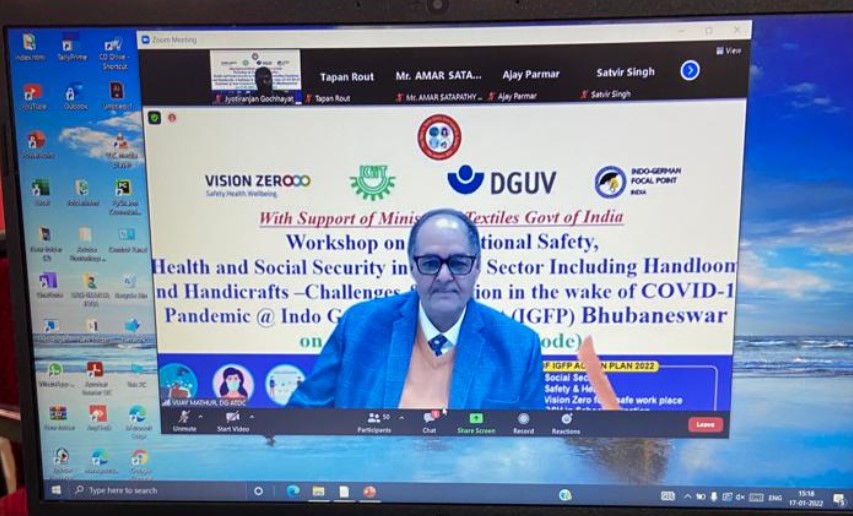
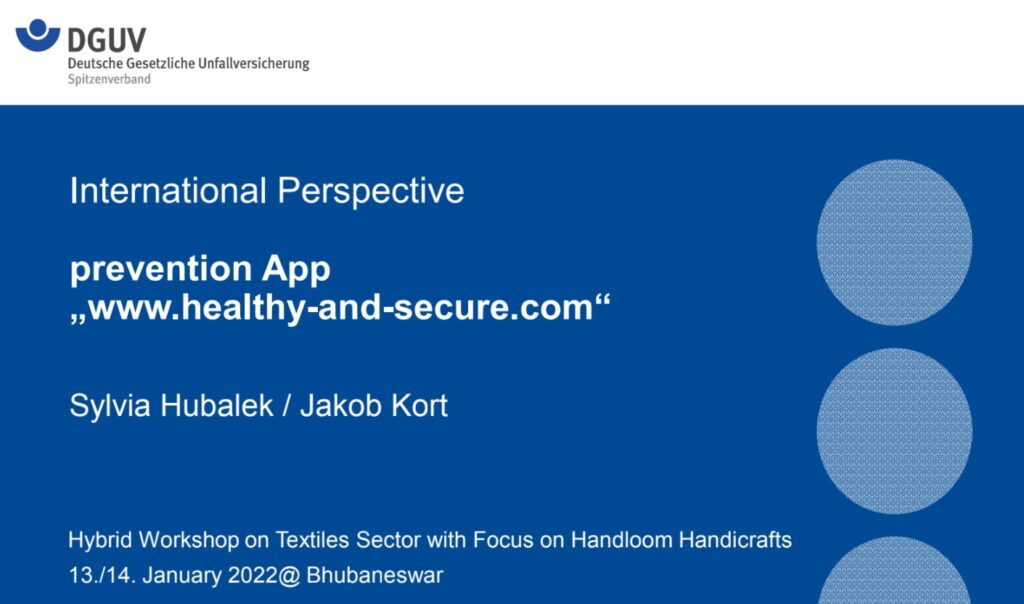

Presentation by Dr. Malay Kumar Pradhan
Presentation by Dr. Somnath
Presentation by Sylvia Hubalek / Jakob Kort
Presentation by Sukhwinder Singh Bhatti
| Goodwill Thanks Message for Today’s Workshop on Textiles Sector Coordinated by IGFP with KIIT university |
| Kort, Jakob <Jakob.Kort@bgbau.de> | Mon, Jan 17, 2022 at 6:03 PM |
| To: bimal sahu <focalpointindia.dguv@gmail.com> | |
Dear Mr. Sahu, thank your very much for your kind E-Mail and that we have been able to show our presentation and the key success factors of the “prevention App”. While I am looking forward to further meetings and workshops, I send best regards from Berlin to India! Jakob Kort Mit freundlichen Grüßen |
Season”s Greetings from IGFP
Dear Valued Partners/ Supporters
Indo German Focal Point ( IGFP ) with strong support of our German Partners led by German Social Accident Insurance ( DGUV ) is promoting Occupational Safety Health ( OSH ) & Social Security ( SS ) since 2017- reaching 23 States & 2 UTs with 20,422 Individuals & 1073 Institutions in India & reaching 32 Countries through Participation in National/ International Programs till Date. Significantly when most were in Low Key during restrictions like Lockdown/shutdown, IGFP could take Awareness/ Training Programs reaching Workers & Industries @ District/ State/ National & International Level.All these could be possible with your Strong Support, IGFP take this Achievement as Stepping Stone to Look Forward to ” A Happy Prosperous Christmas & New Year 2022 for All Our Partners/ Supporters ” with A Message Flowing from 7 Golden Rules of Vision Zero As Way Ahead for 2022- “Zero Tolerance for Accident & Infection @ Workplace/ Home & Road Safety ” & ” Empowering Children & Women that -Parents, You Stay Safe so that the the Family is Secured & Nation is Prosperous”.Thanks once Again ( Stay Safe & Healthy )
With Cheers & Regards
Mr B.K Sahu
Former Insurance Commissioner, ESIC, Ministry of Labour,
Communication Adviser To Insurance Regulatory and Development Authority, IRDA,
Now Director @ Indo- German Focal Point- Prevention & Social Security For India , DGUV
Land No- 0674-2386668,
Mobile- 9040590798/ 9818098844
Our Website:-www.indogermanfocalpoint.com
“5 Years of Indo German Cooperation on OSH, SS”
Activities of Cooperation on OSH SS with Labour Department govt of Haryana
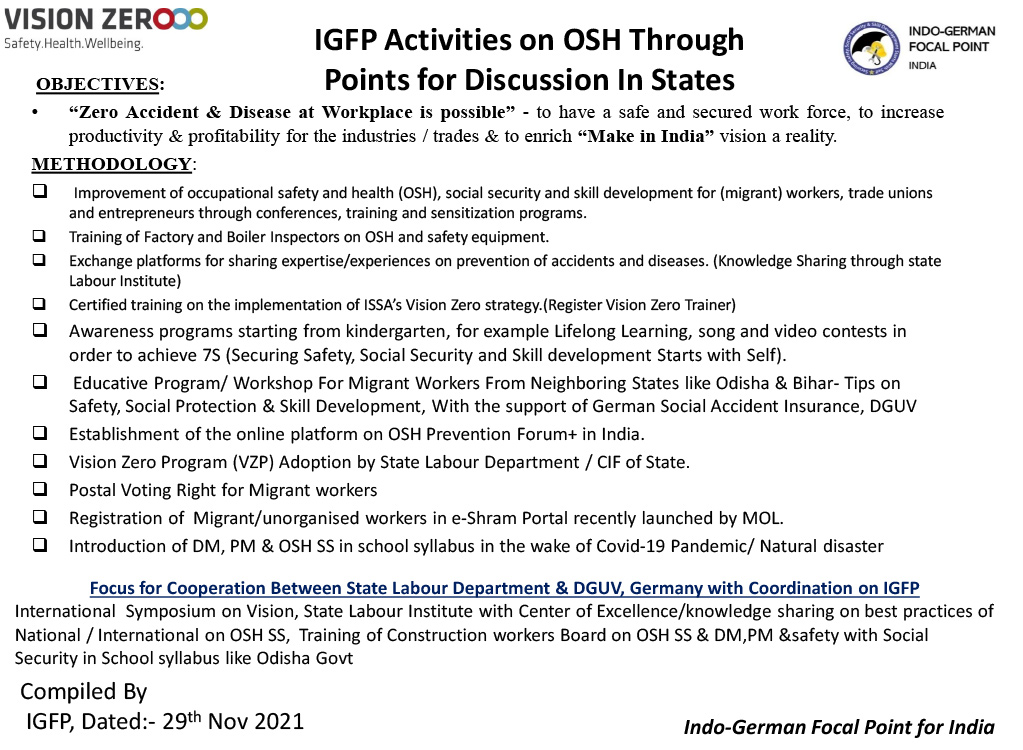

Activities of Cooperation on OSH SS with Labour Department govt of Himachal Pradesh

Dear Mr Dhiman Saheb, IAS ACS( Labour Department ) Govt of Himachal Pradesh
At the outset I would like to express our Sincere thanks for giving A Patience Long Hearing Involving IGFP Presentation on OSH SS with Focus on Areas of Activities of Cooperation – Having A State Level Workshop on Safety Health Social Security in the context of MSME Trade Transportation Electricity Sectors for the State, Knowledge Sharing involving Best Practices on OSH SS, Strengthening of State Labour Institute with Technical Support , Training Awareness Programs involving State Construction welfare Boards & Introduction of OSH /DM/ PM in School Syllabus Your Positive response along with that of the Labour Commissioner who was present in the Meeting on 2nd December 2021in your Office chamber is really encouraging – exhibiting your concern for the welfare of Workers industries in the state. As advised by you ” How to Formalize these areas of Cooperation through MOU”, I would take up with our German Partners led by German Social Accident Insurance (DGUV) in the same manner as per their MOU with DGFASLI ESIC MOL as advised by you for State Labour Department Himachal Pradesh for which copy of this mail is endorsed to Our Partners DGUV ect. Thanks once again and I am enclosing herewith Slide containing Points for Discussion, Few Snaps of our Meeting , Your Goodwill Message as recorded in Safely Health Booklet, Slide containing MOU of DGUV with DGFASLI/ESIC of MOL , IGfP Brochure with Few Programs of International/ National Programs done with Labour Departmet of States so far for your kind perusal & N/ A. Assuring IGFP Coordinated Activities of Cooperation on OSH SS.Would be grateful for your kind response to above.With cheers and regards
Mr B.K Sahu
Former Insurance Commissioner, ESIC, Ministry of Labour,
Communication Adviser To Insurance Regulatory and Development Authority, IRDA,
Now Director @ Indo- German Focal Point- Prevention & Social Security For India , DGUV
Land No- 0674-2386668,
Mobile- 9040590798/ 9818098844
Our Website:-www.indogermanfocalpoint.com

Activities of Co-operation on OSH & SS with Jharkhanda Govt by IGFP


Awareness Program on Safety, Health and Nation Building in the wake of COVID-19 Pandemic with Focus on Zero Tolerance on 14th November 2021 With Strong Support of Unit -1 Govt Boys High School, Bhubaneswar
